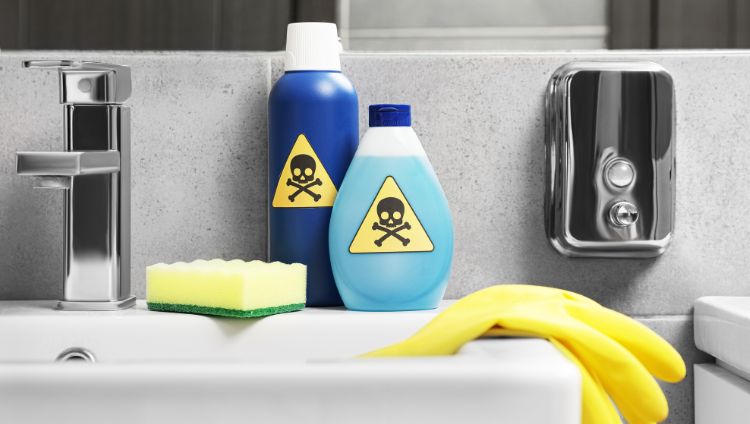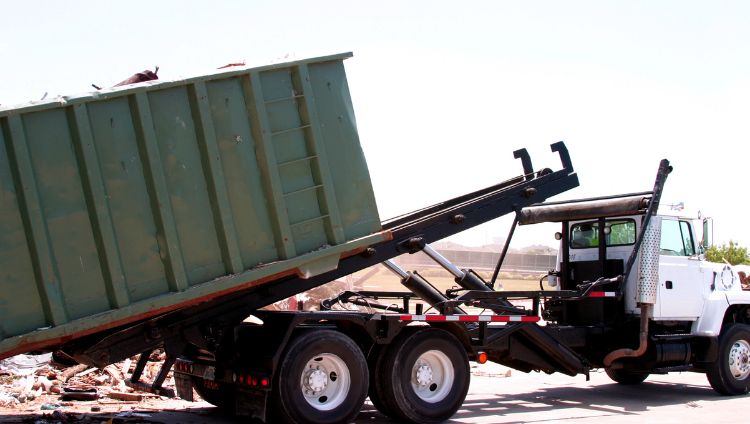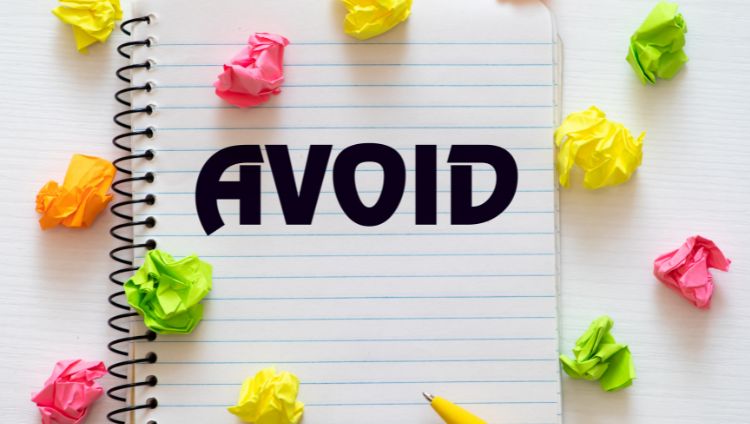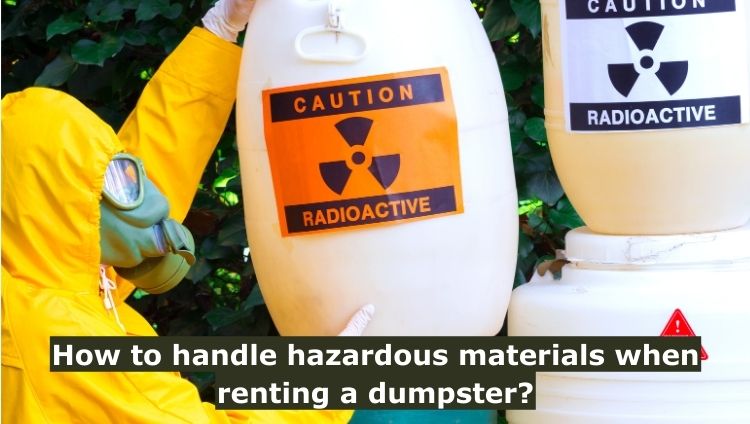Renting a dumpster is a convenient solution for disposing of large quantities of waste during various projects, such as home renovations, construction, or yard cleanup.
However, it’s essential to be aware of the rules and regulations regarding the disposal of hazardous materials when renting a dumpster. Hazardous materials pose significant risks to human health and the environment, so proper handling and disposal are crucial.
In this comprehensive guide, we’xxll provide detailed information on How to handle hazardous materials when renting a dumpster?
1. Identifying Hazardous Materials
Before renting a dumpster, it’s crucial to have a thorough understanding of what constitutes hazardous materials.
Hazardous materials can encompass a wide range of substances, including:
Household chemicals
This category includes products like paints, solvents, cleaning agents, pesticides, and flammable liquids.
Even everyday items like bleach or drain cleaners, which seem harmless, can actually be dangerous.

Construction materials
Some materials used in construction and renovation projects, such as asbestos, lead-based paint, and certain adhesives, can pose potential hazards. Extra precautions may be required when demolishing or renovating older buildings.
Electronics
Old computers, televisions, and batteries contain components that can be hazardous if not disposed of properly. These often contain heavy metals and other toxic materials.

Automotive products
Motor oil, transmission fluid, antifreeze, and car batteries are common hazardous materials generated during auto maintenance. These substances require special handling and disposal.
Medical waste
If you have medical waste, such as needles, syringes, or expired medications, it’s essential to follow specific guidelines for safe disposal to prevent contamination and harm to waste management personnel.
2. Checking Local Regulations
Various regions have unique regulations governing the disposal of hazardous materials.
To stay compliant, reach out to your local waste management authority or visit their website for the relevant rules and guidelines in your area.
Certain hazardous materials may need special permits or must be taken to designated disposal facilities. Understanding these regulations is crucial to prevent legal issues.
For more insight, read How to Achieve Zero Waste Management to learn efficient disposal strategies.
3. Renting a Suitable Dumpster
When renting a dumpster, it’s essential to inform the rental company about the materials you plan to dispose of. They will provide you with a suitable dumpster that complies with local hazardous waste management regulations. Certain dumpsters are specifically designed for hazardous materials, featuring additional safety measures to prevent leaks and spills.
Related Post: How to Choose the Right Dumpster Size for Your Project?

4. Properly Separating Hazardous Materials
To prevent accidents and ensure safe disposal, it’s important to keep hazardous materials separate from non-hazardous waste. Use clearly labeled containers or bags to distinguish between the them. Mixing hazardous materials with regular waste can endanger waste disposal workers.
Proper sorting of materials is key, as highlighted in How to Prevent Cross-Contamination in Recycling Bins.
5. Secure Hazardous Materials Properly
Whenever possible, hazardous materials should be stored in their original containers. If that’s not feasible, opt for leak-proof containers that are clearly labeled with their contents. Ensure that lids are tightly sealed to avoid spills during transportation.
Related Post: How to Dispose of Hazardous Waste Safely?
6. Avoid Overfilling
Don’t stuff the dumpster too much with dangerous stuff. Keep it below the fill line to stop spills or accidents when you’re putting stuff in, moving it, or taking it out.
If you have a lot of dangerous trash, think about renting more than one dumpster or scheduling a few pickups to keep everything safe.
Related Post: How to Properly Load a Dumpster to Maximize its Capacity?

7. Arranging for Proper Disposal
Feel free to get in touch with a licensed facility or service that deals with hazardous waste disposal. They’re pros at handling this stuff safely and in line with all the green rules.
Remember, it’s a big no-no to try and chuck hazardous materials in your regular dumpster. It’s not cool and could seriously mess with our environment.
Emergency Preparedness
In the event of spills or accidents during disposal, it is crucial to have an emergency kit on hand. This kit should include:
- Protective gear: Gloves, safety goggles, and protective clothing to reduce exposure to hazardous substances.
- Absorbent materials: Items such as kitty litter or sand to contain and absorb spills.
- Communication plan: A procedure for promptly reporting incidents to the relevant authorities.
- Emergency contact information: Easily accessible contact details for local environmental agencies and emergency responders in the event of a hazardous materials emergency.
Frequently Asked Questions
What are hazardous materials in the context of dumpster rental?
Hazardous materials include substances that pose a risk to human health or the environment. These can include chemicals, flammable materials, toxic substances, and more.
Can I dispose of hazardous materials in a regular dumpster?
No, you should never dispose of hazardous materials in a regular dumpster. It is illegal and poses significant risks.
How should I dispose of hazardous materials safely when using a dumpster?
You should contact your local waste disposal authority to find out about specific guidelines and disposal options for hazardous materials. Typically, you may need to take them to a designated hazardous waste disposal facility.
Are there any common hazardous materials people might encounter during a cleanup project?
Common hazardous materials include paint, solvents, motor oil, pesticides, batteries, asbestos, electronics, and fluorescent light bulbs.
Can I put old paint cans in a rented dumpster?
No, paint cans are considered hazardous waste, and you should follow your local regulations for their proper disposal.
Some areas have paint recycling programs, while others may require you to take them to a hazardous waste facility.
What should I do with electronics or e-waste when using a dumpster rental service?
Electronic waste should not be thrown into regular dumpsters. Many areas have e-waste recycling programs or drop-off locations to properly dispose of old electronics.
Is it okay to dispose of household cleaning products in a dumpster?
Most household cleaning products are considered hazardous waste and should not be disposed of in a dumpster. Check local regulations for proper disposal methods, which often include designated hazardous waste collection days.
Conclusion:
Choosing a dumpster for waste disposal is a practical choice, but it requires careful attention, particularly when dealing with hazardous materials.
To protect both people and the environment, it’s crucial to identify hazardous items, comply with local regulations, and manage their disposal responsibly.
By following these guidelines, you ensure safer waste management, legal compliance, and the proper handling of hazardous materials.
If you’re unsure of the correct disposal approach, this guide on How to Select an Eco-Friendly Dumpster Rental Company can help ensure your practices align with environmental standards.


